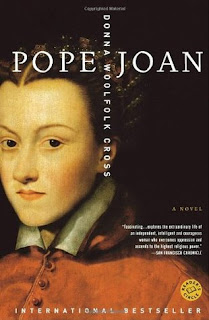Pope Joan by Donna Woolfolk Cross
Pope Joan is seen by some as pure legend and some argue that “history provides many examples of deliberate falsification of records” in order to cover such historical figure as female Pope. Nevertheless, what this book offers is a vivid portrait of the harsh reality for women in the Middle Ages and some went into such measures as to disguise themselves as men to achieve something they would have never had a chance to do as women.
814, Hrotrud, the village midwife of Ingelheim, Frankland, goes to canon’s house to deliver his wife’s third child. The canon doesn’t hide his distaste, when he sees it’s a girl. He names her Joan.
From early age, Joan is a curious child, full of questions. At the age of 6, she asks her oldest brother to teach her to write. Hesitant at first, as education was strictly for men and their father wouldn’t like it, but at her persistence he relinquish. Her pestering continues, now she wants him to teach he tor read, “her eagerness spoke directly to his heart. (…) What a strange creature she was, so inquisitive, so determined, so sure of herself.”
When her oldest brother dies, she continues to dream and yearn for knowledge. “Everyone told her that her desire to learn was unnatural. Yet she thirsted for knowledge, yearned to explore the larger world of ideas and opportunities that was open to people of learning.”
Everything changes when a scholar named Aesculapius arrives at their house. He recognizes that “the girl shows every sign of a prodigious intellect.” He volunteers to teach her. Joan quickly realizes that he is so “different from her father. He refuses to tell her things, insisting instead that she reason her own way to the answer.” And she does to a point that it puts them on a dangerous ground. Aesculapius tells her, “It would probably be wise not to mention this conversation to your father.” He also warns her, “Remember what I tell you, and be careful: some ideas are dangerous.”
When Joan asks her mom why she married her father, her response makes a lot of sense, but she leaves her daughter with these words: “To marry is to surrender everything – not only your body but your pride, your independence, even your life. (…) Heed my words, daughter, if you ever mean to be happy: Never give yourself to a man.”
In order to continue her studies at a Benedictine monastery, she is forced to disguise as a man. Where one sees harshness, another sees opportunity. The library full of books, now Joan can study as much as she wishes. And she also shows brilliant promise as a healer, which later takes her to Rome, where her “successes as a healer put her services much in demand.”
Meticulously researched, brilliantly depicted story of the hardship and harshness of simple living in the Middle Ages, of women being practically a possession of men, of exceptional women disguising as men to achieve unachievable.
This is one of the most engrossing and one of the best books I have ever read.
@Facebook/BestHistoricalFiction
814, Hrotrud, the village midwife of Ingelheim, Frankland, goes to canon’s house to deliver his wife’s third child. The canon doesn’t hide his distaste, when he sees it’s a girl. He names her Joan.
From early age, Joan is a curious child, full of questions. At the age of 6, she asks her oldest brother to teach her to write. Hesitant at first, as education was strictly for men and their father wouldn’t like it, but at her persistence he relinquish. Her pestering continues, now she wants him to teach he tor read, “her eagerness spoke directly to his heart. (…) What a strange creature she was, so inquisitive, so determined, so sure of herself.”
When her oldest brother dies, she continues to dream and yearn for knowledge. “Everyone told her that her desire to learn was unnatural. Yet she thirsted for knowledge, yearned to explore the larger world of ideas and opportunities that was open to people of learning.”
Everything changes when a scholar named Aesculapius arrives at their house. He recognizes that “the girl shows every sign of a prodigious intellect.” He volunteers to teach her. Joan quickly realizes that he is so “different from her father. He refuses to tell her things, insisting instead that she reason her own way to the answer.” And she does to a point that it puts them on a dangerous ground. Aesculapius tells her, “It would probably be wise not to mention this conversation to your father.” He also warns her, “Remember what I tell you, and be careful: some ideas are dangerous.”
When Joan asks her mom why she married her father, her response makes a lot of sense, but she leaves her daughter with these words: “To marry is to surrender everything – not only your body but your pride, your independence, even your life. (…) Heed my words, daughter, if you ever mean to be happy: Never give yourself to a man.”
In order to continue her studies at a Benedictine monastery, she is forced to disguise as a man. Where one sees harshness, another sees opportunity. The library full of books, now Joan can study as much as she wishes. And she also shows brilliant promise as a healer, which later takes her to Rome, where her “successes as a healer put her services much in demand.”
Meticulously researched, brilliantly depicted story of the hardship and harshness of simple living in the Middle Ages, of women being practically a possession of men, of exceptional women disguising as men to achieve unachievable.
This is one of the most engrossing and one of the best books I have ever read.
@Facebook/BestHistoricalFiction

Comments
Post a Comment